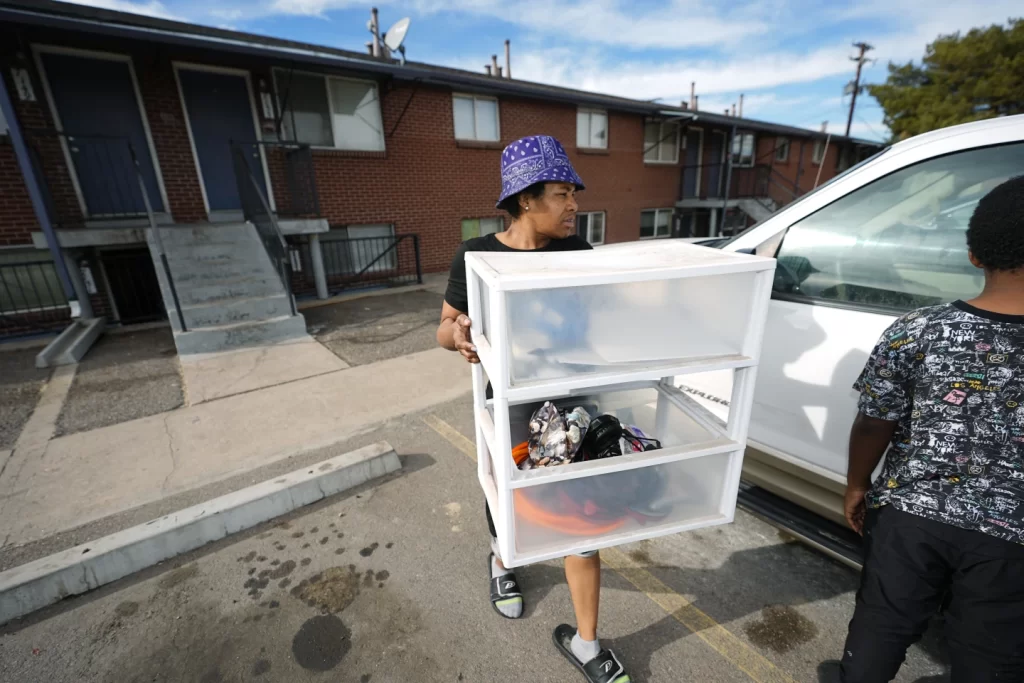
DENVER — Single mom Caitlyn Colbert watched as rent for her two-bedroom apartment doubled, then tripled and then quadrupled over a decade in Denver — from $750 to $3,374 last year.
Every month, like millions of Americans, Colbert juggled her costs. Pay rent or swim team fees for one of her three kids. Rent or school supplies. Rent or groceries. Colbert, a social worker who helps people stay financially afloat, would often arrive home to notices giving her 30 days to pay rent and a late fee or face eviction.
“Every month you just gotta budget and then you still fall short,” she said, adding what became a monthly refrain: “Well, this month at least we have $13 left.”
Millions of Americans, especially people of color, are facing those same, painful decisions as a record number struggle with unaffordable rent increases, a crisis fueled by rising prices from inflation, a shortage of affordable housing and the end of pandemic relief.
The latest data from the Harvard Joint Center for Housing Studies, released in January, found that a record high 22.4 million renter households — or half of renters nationwide — were spending more than 30% of their income on rent in 2022. The number of affordable units — with rents under $600 — also dropped to 7.2 million that year, 2.1 million fewer than a decade earlier.
Those factors contributed to a dramatic rise in eviction filings and a record number of people becoming homeless.
“It’s one of the worst years we’ve ever seen,” said Whitney Airgood-Obrycki, a senior research associate at the Harvard center, who added that the level of cost-burdened households in 2022 had not been seen since the Great Recession in 2008, when 10 million Americans lost their homes to foreclosure.
After failing to make a significant dent in the problem over the last decade, state and federal lawmakers across the U.S. are making housing a priority in 2024 and throwing the kitchen sink at the issue — including proposals to enact eviction protections, institute zoning reforms, cap annual rent increases and dedicate tens of billions of dollars toward building more housing.
The hardest hit have been renters who made less than $30,000, and who, after paying rent and utilities, were left with just $310 a month on average, Airgood-Obrycki said.
“So you can certainly imagine the kinds of tradeoffs that have to happen,” she said. “Cost-burden renters are spending less on things like food and health care and retirement. So, there are significant implications for the long-term well-being of these households.”
In Denver, Colbert’s bathroom roof partly caved in from a leak last year, and the landlord delayed a fix even as rent went up $200 a month. It was the last straw for Colbert, who moved in to live with family and is purchasing a home through Habitat for Humanity, which gave her a low-interest loan.
“It’s so disheartening, paying so much and not even seeing where your rent is going,” Colbert said. “It just hits you like, ‘This is for nothing.’”
In Auburn, Massachusetts, pervasive rent hikes have already hit the last bastion of affordable housing.
Just off an interstate alongside a pond, residents at the American Mobile Home Park face rent increases upwards of 40%. Many tenants, mostly seniors and others on fixed incomes, haven’t signed new leases with those increases. The group Lawyers For Civil Rights has sent a letter to the landlord accusing it of “unconscionable rent increases,” and failing to provide critical services like adequate garbage and snow removal.“How am I going to pay that?” said Amy Case, 49, wondering how she’ll balance the $345 monthly increase with the $200 she has to spend on medications and the cost of a twice-yearly MRI to monitor her brain tumor.
“I don’t know what else to cut back on,” said Case, an administrative assistant at a local college, who said she would only have $300 left over each month for other necessities. “Probably less groceries. I certainly can’t cut back on my medications.”
Another tenant, 72-year-old Ann Urbanovitch, who works as a cashier at a department store, is facing a similar rent increase.
“I expected it to go up $100, but $345. I was shocked,” she said. “I have to dip into my retirement savings … because, you know, times are tough.”
The mobile home park owner, Parakeet Communities, did not respond to a request from The Associated Press for comment.
With many families struggling to pay, landlords in Colorado are increasingly turning to evictions, with over 50,000 evictions filed last year, according to data from the Colorado Judicial Branch.




